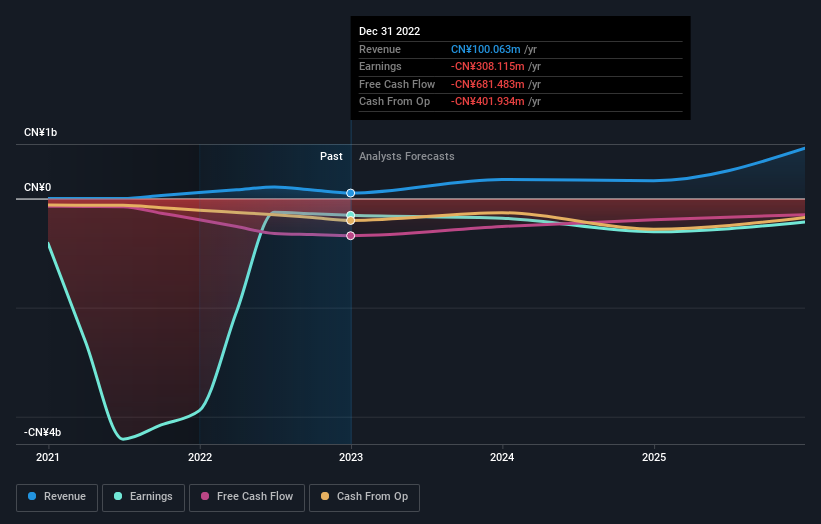Individual investors invested in Keymed Biosciences Inc. (HKG:2162) copped the brunt of last week's HK$3.5b market cap decline

Key Insights
- Significant control over Keymed Biosciences by individual investors implies that the general public has more power to influence management and governance-related decisions
- The top 9 shareholders own 50% of the company
- Institutional ownership in Keymed Biosciences is 20%
A look at the shareholders of Keymed Biosciences Inc. (HKG:2162) can tell us which group is most powerful. The group holding the most number of shares in the company, around 46% to be precise, is individual investors. In other words, the group stands to gain the most (or lose the most) from their investment into the company.
And last week, individual investors endured the biggest losses as the stock fell by 24%.
In the chart below, we zoom in on the different ownership groups of Keymed Biosciences.
View our latest analysis for Keymed Biosciences

What Does The Institutional Ownership Tell Us About Keymed Biosciences?
Many institutions measure their performance against an index that approximates the local market. So they usually pay more attention to companies that are included in major indices.
As you can see, institutional investors have a fair amount of stake in Keymed Biosciences. This implies the analysts working for those institutions have looked at the stock and they like it. But just like anyone else, they could be wrong. It is not uncommon to see a big share price drop if two large institutional investors try to sell out of a stock at the same time. So it is worth checking the past earnings trajectory of Keymed Biosciences, (below). Of course, keep in mind that there are other factors to consider, too.

Hedge funds don't have many shares in Keymed Biosciences. Moonshot Holdings Limited is currently the largest shareholder, with 28% of shares outstanding. Keymed Talent Success Trust is the second largest shareholder owning 5.9% of common stock, and Hillhouse Investment Management, Ltd. holds about 4.9% of the company stock.
We did some more digging and found that 9 of the top shareholders account for roughly 50% of the register, implying that along with larger shareholders, there are a few smaller shareholders, thereby balancing out each others interests somewhat.
Researching institutional ownership is a good way to gauge and filter a stock's expected performance. The same can be achieved by studying analyst sentiments. There are a reasonable number of analysts covering the stock, so it might be useful to find out their aggregate view on the future.
Insider Ownership Of Keymed Biosciences
While the precise definition of an insider can be subjective, almost everyone considers board members to be insiders. Management ultimately answers to the board. However, it is not uncommon for managers to be executive board members, especially if they are a founder or the CEO.
Most consider insider ownership a positive because it can indicate the board is well aligned with other shareholders. However, on some occasions too much power is concentrated within this group.
Our data cannot confirm that board members are holding shares personally. It is unusual not to have at least some personal holdings by board members, so our data might be flawed. A good next step would be to take a look at this free summary of insider buying and selling.
General Public Ownership
With a 46% ownership, the general public, mostly comprising of individual investors, have some degree of sway over Keymed Biosciences. This size of ownership, while considerable, may not be enough to change company policy if the decision is not in sync with other large shareholders.
Private Company Ownership
Our data indicates that Private Companies hold 28%, of the company's shares. It might be worth looking deeper into this. If related parties, such as insiders, have an interest in one of these private companies, that should be disclosed in the annual report. Private companies may also have a strategic interest in the company.
Next Steps:
While it is well worth considering the different groups that own a company, there are other factors that are even more important. To that end, you should learn about the 3 warning signs we've spotted with Keymed Biosciences (including 1 which is a bit concerning) .
If you would prefer discover what analysts are predicting in terms of future growth, do not miss this free report on analyst forecasts.
NB: Figures in this article are calculated using data from the last twelve months, which refer to the 12-month period ending on the last date of the month the financial statement is dated. This may not be consistent with full year annual report figures.
Valuation is complex, but we're here to simplify it.
Discover if Keymed Biosciences might be undervalued or overvalued with our detailed analysis, featuring fair value estimates, potential risks, dividends, insider trades, and its financial condition.
Access Free AnalysisHave feedback on this article? Concerned about the content? Get in touch with us directly. Alternatively, email editorial-team (at) simplywallst.com.
This article by Simply Wall St is general in nature. We provide commentary based on historical data and analyst forecasts only using an unbiased methodology and our articles are not intended to be financial advice. It does not constitute a recommendation to buy or sell any stock, and does not take account of your objectives, or your financial situation. We aim to bring you long-term focused analysis driven by fundamental data. Note that our analysis may not factor in the latest price-sensitive company announcements or qualitative material. Simply Wall St has no position in any stocks mentioned.
About SEHK:2162
Keymed Biosciences
A biotechnology company, focuses on in-house discovery and development of biological therapies in the autoimmune and oncology therapeutic areas.
Excellent balance sheet and fair value.
Market Insights
Community Narratives



